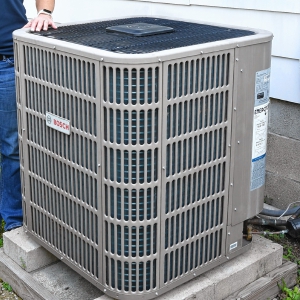Senate plans another push for major early ed bill

Senate President Karen Spilka reads a book to children at a Head Start center in Malden. SAM DRYSDALE/SHNS
| Published: 03-11-2024 5:00 PM |
BOSTON — Despite a tightening state budget picture, the Senate this week plans to take up a pricey early education and child care bill aimed at expanding access to education for the state’s youngest learners and making it more affordable for families, with Senate President Karen Spilka saying the state can’t afford not to take action.
The Senate plans to put the bill (S 2619) on the floor on Thursday. During a press conference last week at a Head Start center, no cost estimate was offered but the bill calls for sustained investments at a time when tax receipts are faltering. A Senate Ways and Means Committee summary of the plan said it will be funded by $1.5 billion that’s included in this year’s state budget, which Gov. Maura Healey signed in August 2023, and “will be subject to additional appropriations in future fiscal years.”
“The impact on the children, the positive impact that lasts throughout their whole lives by participating in programs like this, we can’t afford to not do this,” Spilka said when asked about the bill’s price tag.
The average annual cost for child care in Massachusetts exceeds $20,000, reflecting more than 22% of the median family’s income and more than 75% of the wages a typical early educator earns, according to a 2022 special legislative commission report.
The sweeping reform bill is aimed at aiding child care and early education providers, fortifying the pipeline of workers entering that field, and helping more families access the costly service vital to their economic success.
“[Early education] increases a student’s success later on in their life — throughout their whole life, research shows, it increases their success. It allows parents to jump back into their jobs and gives educators a career path that they can be in for the long haul,” Spilka said.
The bill resembles a similar one the Senate passed in 2022 that did not make it through the House. The exact price tag on that early education and care bill was also unclear, though Senate leaders pointed to the special commission report estimating it would cost “upwards of $1.5 billion annually over time” to implement its recommended changes.
Some of those changes recommended by the commission — such as expanded child care grants — have already started coming into effect, even without a large-scale bill.
Article continues after...
Yesterday's Most Read Articles
 Orange Selectboard declares armory as surplus property
Orange Selectboard declares armory as surplus property
 Sportsman’s Corner: Orange Gun Club’s Kids Derby
Sportsman’s Corner: Orange Gun Club’s Kids Derby
 Volunteers repaint Athol gazebo for veterans memorial service
Volunteers repaint Athol gazebo for veterans memorial service
 Battery storage bylaw passes in Wendell
Battery storage bylaw passes in Wendell
 Debt-burdened UMass students, grads rally for relief
Debt-burdened UMass students, grads rally for relief
 Committee forms to oppose psychedelics push in Mass
Committee forms to oppose psychedelics push in Mass
“This legislation will be funded by the more than $1.5 billion appropriated for early education and care in the fiscal year 2024 budget, a 78 percent increase over fiscal year 2021, and will be subject to additional appropriations in future fiscal years,” says a poll from the Senate Ways and Means Committee on a redraft of the bill.
The bill would codify into law a plan to spend the $1.5 billion already appropriated in the fiscal year 2024 budget. It lays out a plan for how the state can implement additional funding in years to come, which is subject to appropriation in future budgets, but doesn’t obligate the state to specific investment numbers in the future.
The Senate bill included many of the recommendations that the 2022 legislative commission said would help make child care more affordable for families and a more viable career for those working in the sector.
If approved, the bill would gradually raise the ceiling for early education and child care subsidies, opening up access to some degree of aid for many more Massachusetts families.
Current law limits subsidies to households whose incomes equal 50% or less the state median income, or $73,000. The bill would raise the eligibility threshold to 85% of the state median income, which is $124,000 for a family of four, according to Education Committee Co-chair Sen. Jason Lewis. Subject to available funding, it would also eventually raise the eligibility threshold to 125% of state median income, or $182,000 for a household of four. Lower income families would still be prioritized.
Additionally, the bill would require that parents’ out-of-pocket fees for subsidized children be no more than 7% of family income.
Other sections of the legislation seek to “stabilize” providers by creating a permanent framework for Commonwealth Cares for Children, or C3, stabilization grants. These C3 grants helped keep early education centers afloat during the pandemic, and Gov. Healey recommends $475 million to continue the grants in her pending budget. The bill would set minimum criteria for the formula the administration would use to distribute that funding, Lewis said.
According to Spilka’s office, more than 90% of the early education and care programs in the state receive these grants.
To qualify for that increased and more regular pot of dollars, providers would need to show they are willing to enroll subsidized children, something that Lewis said is not universal in the current early education landscape.
The expansive bill also seeks to address workforce shortages in the sector, which industry representatives say is one of the biggest challenges facing the system.
“This is a whole system problem that demands a whole system solution. It’s pretty simple when you think of it in that way,” Spilka said.
The early education bill directs the Department of Early Education and Care to develop a “career ladder” for early educators that establishes recommended salary and benefit guidelines commensurate with public school teachers.
Additionally, it seeks to establish a competitive grant program to encourage employers to set up new early education and care centers around the state, with preference given to lower-income families and child care deserts, and require the Department of Higher Education to permanently administer existing scholarship and loan forgiveness programs.
Though the early childhood care expansion would cost the state billions of dollars, the Massachusetts Taxpayers Foundation released a report in 2022 that said the state loses $2.7 billion each year due to inadequate access to child care.
That number was calculated from a combination of $1.7 billion in lost earnings for employees who reduce or leave work to take care of their children, $812 million in additional costs and lower productivity for employers, and $188 million in lower tax revenues for the state.

 North Quabbin Notes, May 6
North Quabbin Notes, May 6 Rice’s Roots Farm owner plans for community involvement for land’s future
Rice’s Roots Farm owner plans for community involvement for land’s future Loan program aims to ease burden of home energy retrofits
Loan program aims to ease burden of home energy retrofits Community Legal Aid expands Disability Benefits Project to Franklin County
Community Legal Aid expands Disability Benefits Project to Franklin County